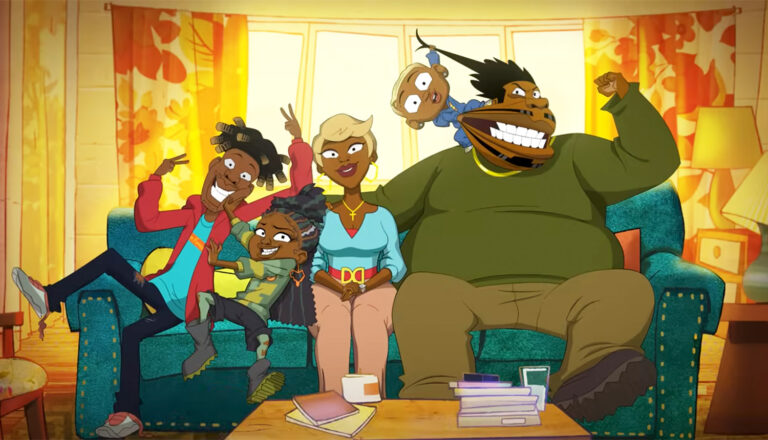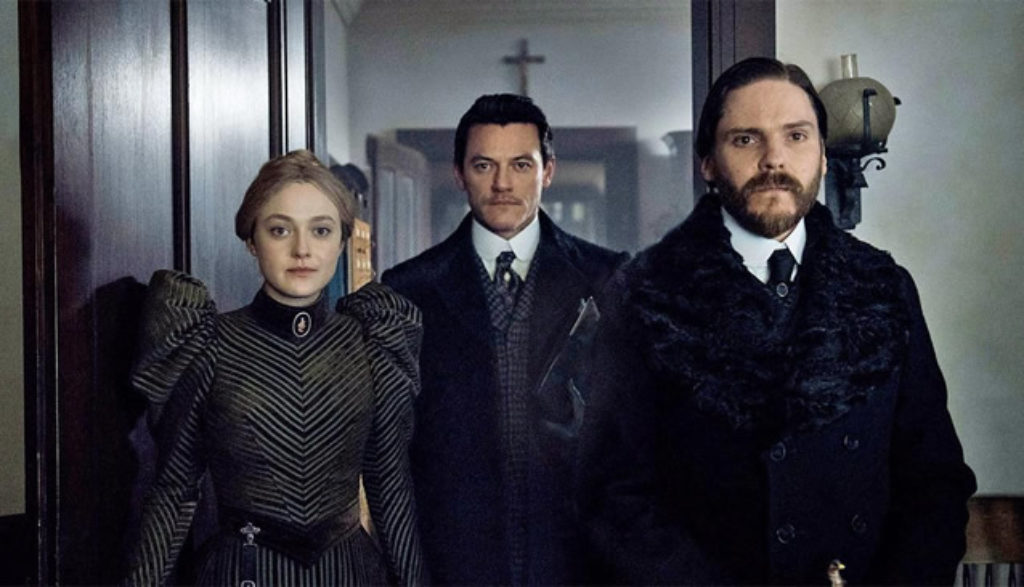
Good Times
Netflix takes a classic sitcom, Good Times, and turns it into a vulgar, violent, sexually-charged TV-MA show.

It’s never been easy to catch a killer.
But imagine trying to catch ’em before DNA evidence. Before our cell phones tracked our every move and dutifully catalogued every text. Before even fingerprints were accepted evidence.
And that assumes the police even want to find the murderer. In Season One, they argued that Georgio Santorelli, a 13-year-old boy who worked as a prostitute in New York’s meanest of mean streets in 1896, deserved his cruel fate. Now, in Season Two (called Angel of Darkness after the book it’s based on), police pin the disappearance of two infant children on the parents.
If these poor souls are to find justice, Dr. Laszlo Kreiszler and his brave band of helpmates will have to find the killers. And they’ll have to do it the really old-fashioned way.
Laszlo is a psychologist, or “alienist” as they were called back in the day. This TNT series tells us that they were so called because their patients were thought to be “alienated from their own true natures.” Laszlo has a particular interest in criminal psychology, which makes him a forerunner to today’s criminal profiler.
But you could argue that Laszlo—at least in this show’s understanding—is a bit of an alien from 19th-century culture himself. He trusts women. He trusts forensic evidence. He doesn’t trust religion one little whit. And he’d certainly be in favor of a more, um, liberal attitude toward sex than was typical back in Victorian-era America. Why, it’s almost as if a politically correct time machine traveled to 2018, nabbed a suitably enlightened denizen of our time and dropped him into 1896 New York City. Because really, what gritty, realistic period drama couldn’t be improved with a little 21st-century paternalistic air of superiority?
And indeed, if Laszlo has a fault, it’s that he seems to believe himself faultless.
But Laszlo may have found his match in Sara Howard, who now owns her own private detective agency. It’s possible that she, too, is less a product of her time and more of that same time machine: Strong and able, she’s madea career for herself and has little time for the era’s rampant sexism—whether it be the leering ogles of folks in the police department or the misguided gallantry of her friend and associate John Moore.
The three of them, along with police inspectors Marcus and Lucius Isaacson, are determined to apprehend what we’d call serial killers today. And therein we begin our significant litany of issues with this show.
First, the violence. The Alienist, based on best-selling books by Caleb Carr, is as gruesome and as brutal as anything we’ve seen this side of premium cable, and well into R-rated territory if it had landed in movie houses instead. (After all, Angel of Darkness’ victims are babies, and we see this evidence on screen.) Viewers see horrifically mutilated bodies and terrible evidence of disease. During the show’s first season, The Atlantic said that it’s a “veritable grab bag of triggering visuals and nauseating images.” The Parents Television Council used the show as an opportunity to plead for à la carte television. “Those who want to watch explicit content like The Alienist should be able to choose to pay for it,” PTC President Tim Winter said in a statement. “But it is unconscionable that those who are offended by it must also underwrite it.”
And the series can get into other tricky territory as well. Lest we forget, the victims of Season One’s brutal acts are boys—boys who have been perhaps abused and brutalized for years as, essentially, prostitutes in New York’s most unsavory districts. These pubescent sex workers wear women’s clothing (and often skimpy clothing at that) and call each other by female names, and they cater to a presumably same-sex clientele. While The Alienist implies that most are forced into the industry, it also suggests that most of these underage prostitutes are beaten into it because of their own same-sex leanings: In the show’s telling, the brothels where these boys work and the clients who pay them are less complicit in their corruption than their intolerant moms and dads.
Indeed, it seems that faith and religion are as much societal enemies as serial killers in The Alienist. A Catholic priest is seen serenely watching police beat a man nearly to death. In one episode, a man berates Laszlo for his apparent lack of faith, then says flatly that a 13-year-old boy—mutilated almost beyond recognition—”had it coming.”
The Alienist seems determined to lump religion in with racism, sexism, poverty and indifference as the greatest social ills present at the turn of the century. This despite the fact that, in those days before pervasive social programs, the Church was about the only place that the abused and poverty-stricken could turn to for help. I’m sure that Christianity had its share of bigots and jerks back then, just as it does now. But this series’ depiction of the faith so far is disappointingly one-sided. For all of Laszlo’s enlightened tolerance for those of different races, genders and sexual orientations, the show itself seems to harbor a vitriolic bias against Christianity.
The Alienist depicts its share of graphic and lewd sexual encounters between adults as well. Drinks are quaffed, cigars smoked and, while the language does stay a bit cleaner (and more period-appropriate) than you might expect given all the other problems, it can still stray into the foul, too.
TNT’s The Alienist is as dirty, messy and brutal as the streets from which it pulls its story. And even while its intrepid, enlightened heroes track down killers, the show itself hacks away at its viewers’ mind, heart and soul.
Sara’s employee, Bitsy, goes undercover at the Lying-In Hospital to gather information on the corruption within. Meanwhile, Sara and Laszlo attend John’s engagement party in order to get closer to the hospital’s owner, who they think might be the killer.
A woman slaps the hospital matron, chokes her and then stabs her in the neck repeatedly. She then paints the woman’s face with her own blood to make the corpse look like a baby doll. Someone is poisoned via a drug-filled syringe, but a doctor is able to administer the antidote before she dies. A woman is slapped and chased by another after insulting her.
We see the pictures of many dead children, made up to look like they are sleeping for the grieving parents. There are several conversations about stillborn babies and the grief associated with losing a child. We learn that two mothers who lost their children later took their own lives.
Laszlo’s team discovers that the mistresses of wealthy men brought to the Lying-In Hospital always have stillborn children and are sterilized after the births. They suspect that these children are actually being murdered. We hear the details of an infant’s murder.
Several women covered in blood from helping in a childbirth clean a hospital room. There are several guns hanging in Sara’s office. Someone lies about being late to work, saying that the tram hit a person. A woman picks a lock to enter an off-limits room.
A woman wearing a corset and underskirt kisses her fiancé and tries to undress him. Another woman’s back is partially exposed as she tries to dress herself after a surgery. Women wear dresses with cleavage at a ball. A man says it’s OK to have multiple mistresses since the girls weren’t “innocent.” Someone says that “Chief Mistress” was a royal court position in France. People drink champagne and smoke cigars and cigarettes. Sara puts her cigarette out in a man’s drink.
It is implied that a woman won’t be able to write about New York’s high society because she is black. After being publicly humiliated by his fiancé and her godfather, a man pretends he doesn’t mind but admits that he stays with her because he doesn’t want to wind up alone. There is a reference to male genitals. God’s name is misused several times. People light candles in a church for the lost.
Dr. Lazlo, Sara and John uncover a letter that leads them to look for a murderer known for his graphic abuse and mutilation of children. Sara suggests that the letter indicates the murderer was abused by his mother, causing Lazlo to rethink his own hypothesis. The team works with the police to discover the identity of the murderer, but the police seek out the wrong culprit.
The letter from the murderer includes phrases such as “saucy” and “dirty immigrant” in reference to young boys. The team concludes the murderer has an obsession with “the desecration of the body” and is both violent and sadistic. The murderer is seen dancing with a young boy in a dress and pouring drugs into his drink; he also gives him a milk bath (though we only see the boy’s head and shoulders). The murderer is also kissed on the cheek by his mother, and he violently protests her affection.
In an effort to realign his own thought process and understand the murderer, Lazlo and John head to a prison to speak with Lazlo’s old patient, known as “Hildebrandt’s Starling.” This child killer tries to convince Lazlo he murdered them (and mutilated their faces) because of his own disfigured face. He also tries to stab Lazlo once Lazlo realizes he’s lying. The guards violently beat the patient.
The team uncovers that the murderer has been killing boys on “holy days” based upon the Christian calendar.
John and Sara occasionally flirt and John mock proposes to Sara, until he realizes she might marry him if he were a better man. He quits drinking, but continues to smoke.
Other characters smoke cigarettes and cigars, as well as drink whiskey, wine and other hard liquor. John’s mother suspects he has a hangover. We hear the word “d—ed.” Pictures of mutilated boys are seen and discussions of their entrails are heard. Masturbation and ejaculation are discussed. A bishop explains that “we’re all evil” and “everyone is born in sin.”
Laszlo and his team formalize their partnership over dinner to capture 13-year-old Georgie’s killer. But after Laszlo offends his somewhat inebriated friend, John Moore, John decides to walk home—then takes a detour to a boy brothel to do some investigating himself.
We see lots of pubescent lads there, many seemingly in their early teens. Most are shirtless or wear women’s clothes and are heavily made up, flirting with the adult male clientele. One leads John to a back room. Despite John’s insistence that he’s just there only for information, the boy kneels down as if preparing to perform a sex act. The brothel’s owner, however, has drugged John’s drink: He passes out on a bed and several other half-dressed teen boys come and writhe about the impaired visitor.
We hear deceased Georgio—called “Gloria” at work—was “not like other boys,” and that he ran away from home because his father beat him because of those apparent differences. Someone says that he died in sin, while another says he deserved to die. In the same neighborhood, we see other presumed prostitutes—some women in revealing outfits, some men dressed as women—loitering in the alleys. Two people noisily and graphically have sex. (The man’s rear is visible, and both are apparently naked.) They introduce themselves to each other as they’re in the throes of passion. We also see Sara, one of Laszlo’s helpers in the murder case, in some bust-augmenting undergarments and a slightly revealing dress. A policemen ogles and try to flirt creepily with her. Laszlo and Sara seem to flirt, too.
Laszlo examines a young girl underneath her dress as her mother frets that the girl masturbates every day. “The priests say she’s losing her mind,” the mother says. Laszlo says she’s just becoming a young woman. A priest (who’s mysteriously privy to the goings on in this case) insists the girl needs God, not a doctor, and that her body is “a blessed gift not to be defiled by lust.” Laszlo quotes Scripture back to the priest (“Whoever does not love, does not know God”). Lazlo says that God never gave him answers, only questions; and he finally declares that his business is “a sanctuary for the young. I will not tolerate its trespass, neither by man nor by God.”
A woman talks about lighting candles for the Sabbath. A priest watches and prays as police beat a man almost to death. (A boy later says that he’s a “holy Joe.”) We see the brutalized man hit, kicked, thrown down flights of stairs and smashed into the ground. Later, we see his bloodied face. A man cuts an eyeball out of a cow skull. We see pictures—both photographic and drawn—of dead and sometimes mutilated boys. There’s discussion of how one victim had his tongue removed. Someone sticks tubes into cadavers and lights the tubes on fire, like candles.
Characters drink a variety of alcoholic beverages (a Jewish diner suspects the wine is not “kosher”), and one smokes quite a bit. We hear verbal references to masturbation, mutilation, prostitution and suicide. Characters misuse God’s name four times. We also hear “d–n” and “b–ch.”


Paul Asay has been part of the Plugged In staff since 2007, watching and reviewing roughly 15 quintillion movies and television shows. He’s written for a number of other publications, too, including Time, The Washington Post and Christianity Today. The author of several books, Paul loves to find spirituality in unexpected places, including popular entertainment, and he loves all things superhero. His vices include James Bond films, Mountain Dew and terrible B-grade movies. He’s married, has two children and a neurotic dog, runs marathons on occasion and hopes to someday own his own tuxedo. Feel free to follow him on Twitter @AsayPaul.

Emily studied film and writing when she was in college. And when she isn’t being way too competitive while playing board games, she enjoys food, sleep, and geeking out with her husband indulging in their “nerdoms,” which is the collective fan cultures of everything they love, such as Star Wars, Star Trek, Stargate and Lord of the Rings.

Kristin Smith joined the Plugged In team in 2017. Formerly a Spanish and English teacher, Kristin loves reading literature and eating authentic Mexican tacos. She and her husband, Eddy, love raising their children Judah and Selah. Kristin also has a deep affection for coffee, music, her dog (Cali) and cat (Aslan).

Netflix takes a classic sitcom, Good Times, and turns it into a vulgar, violent, sexually-charged TV-MA show.

While its protagonist might live a nuanced life, The Sympathizer’s problematic content can’t be described the same way.

Say hola once again to the iconic explorer in this faithful reboot of the children’s series.

Based on a popular video game, Ark: The Animated Series features hungry dinosaurs, bloodthirsty people and plenty of problems.